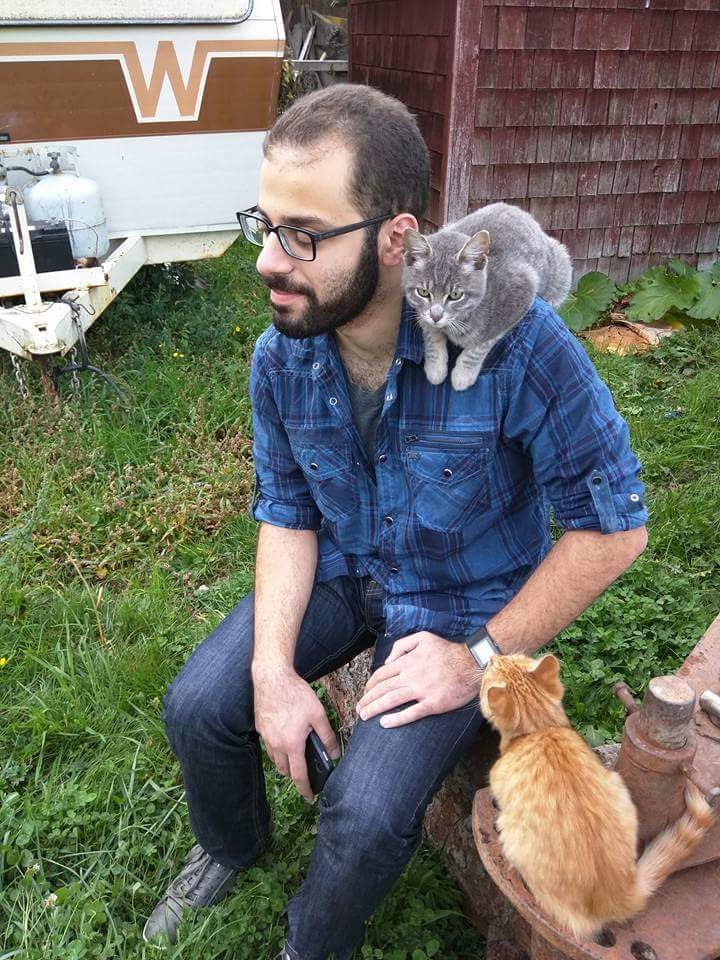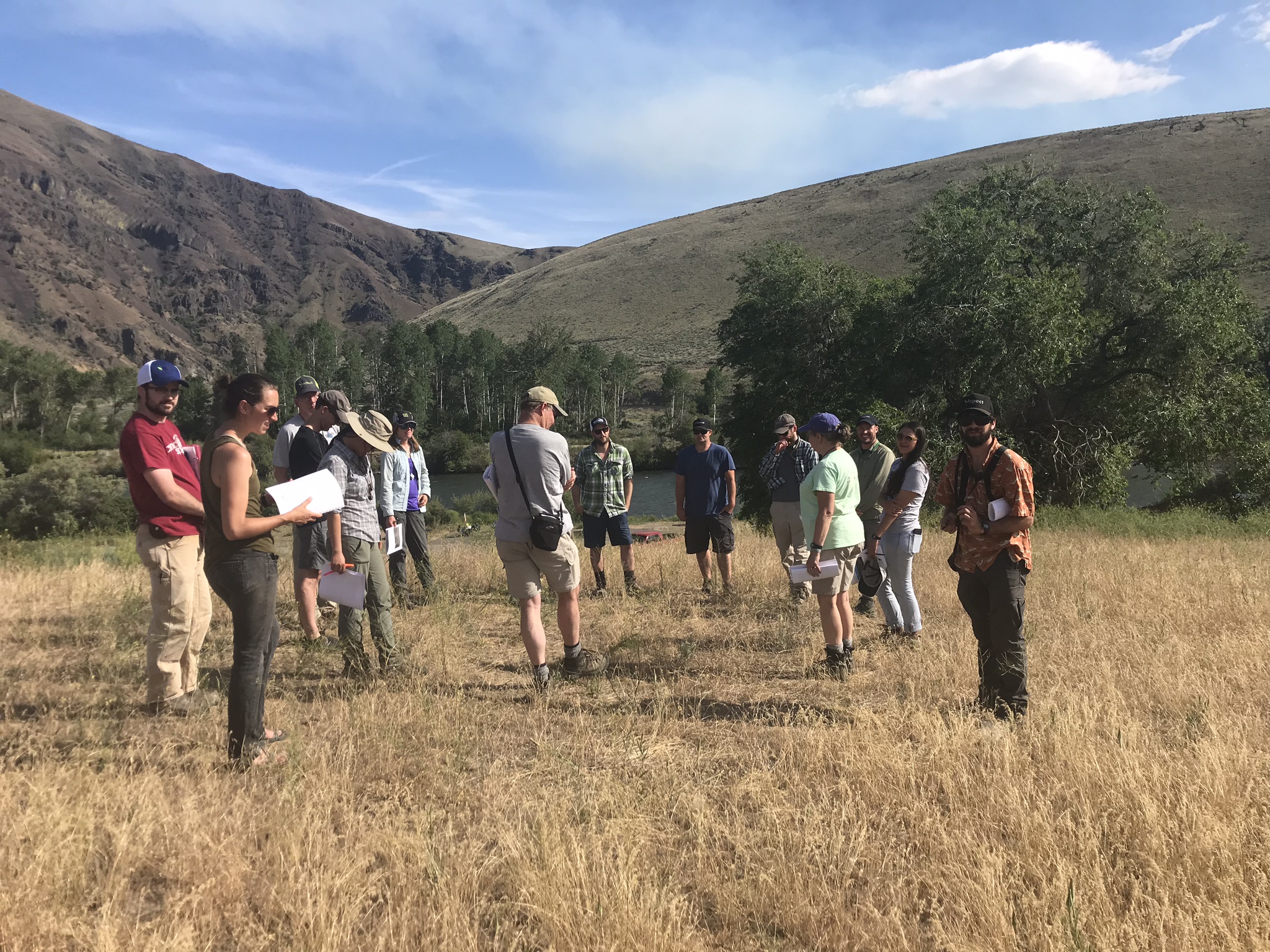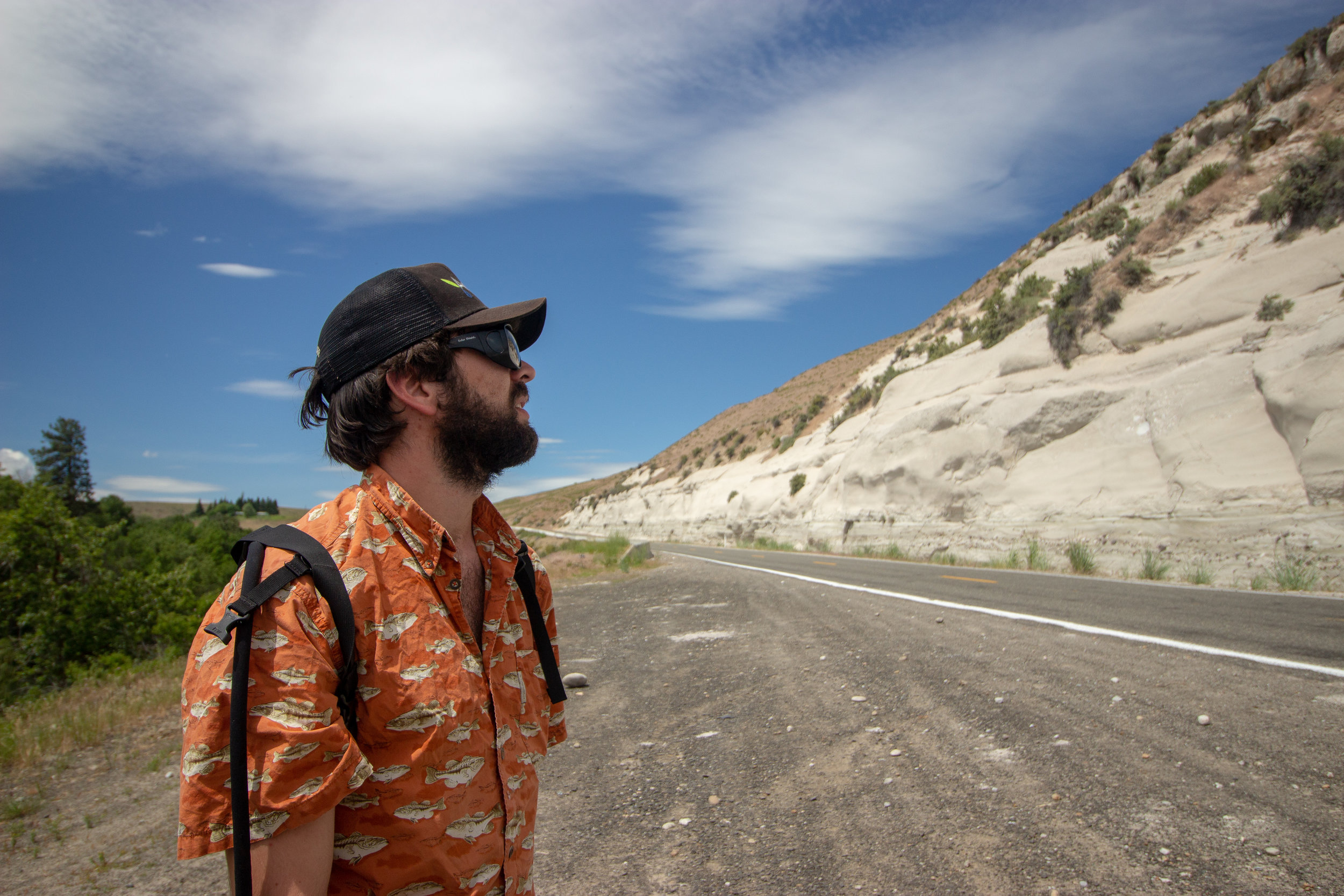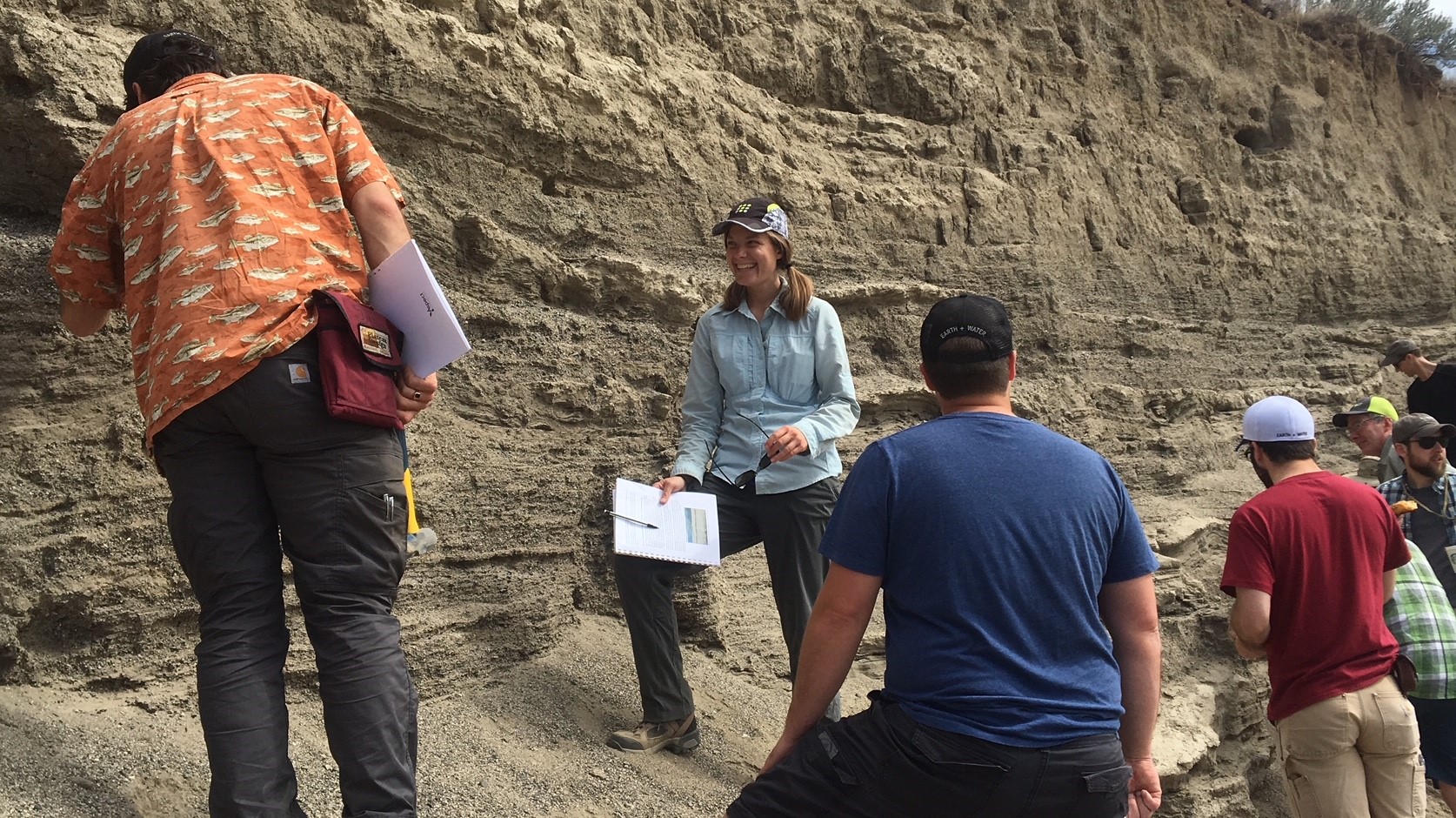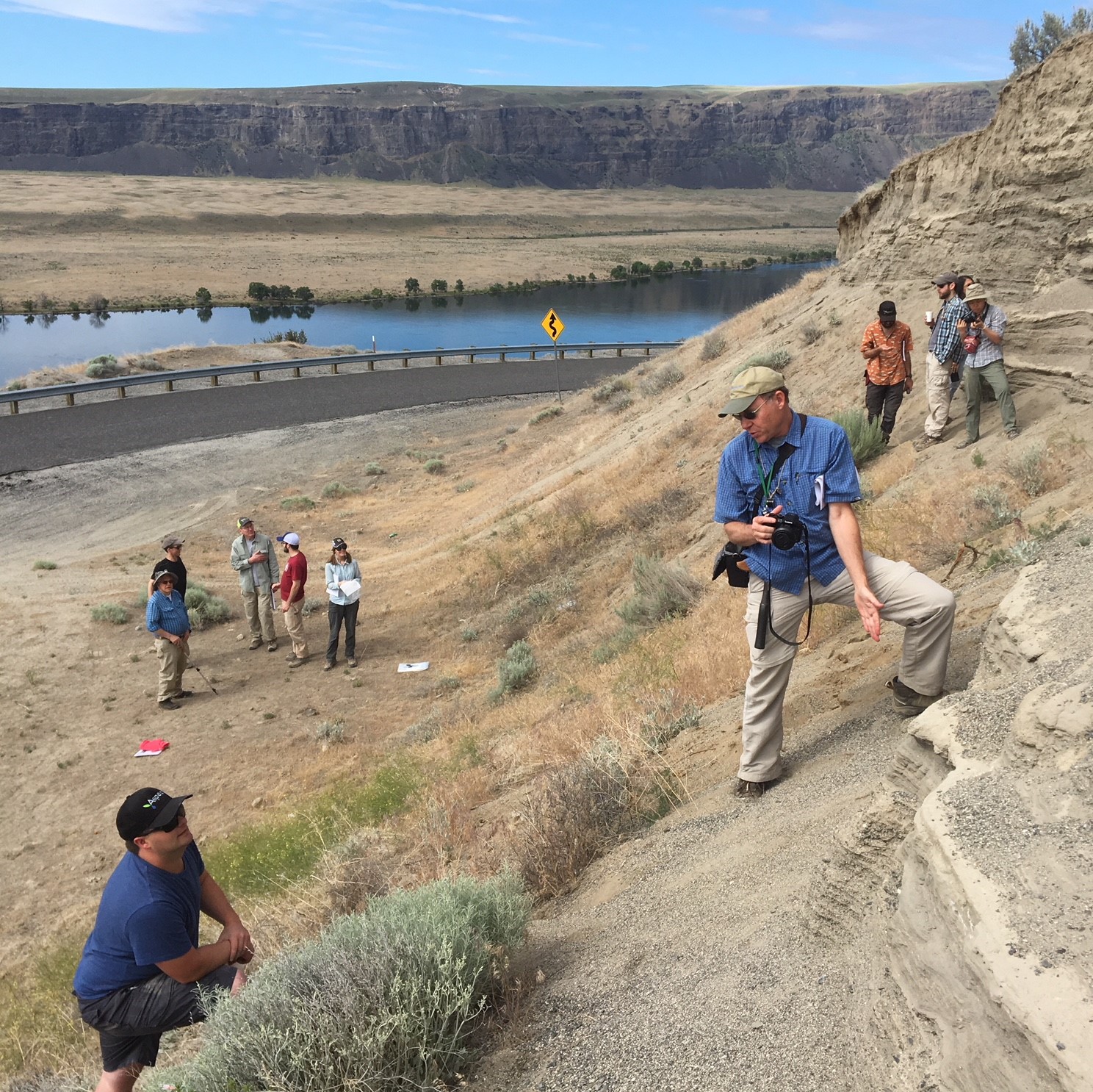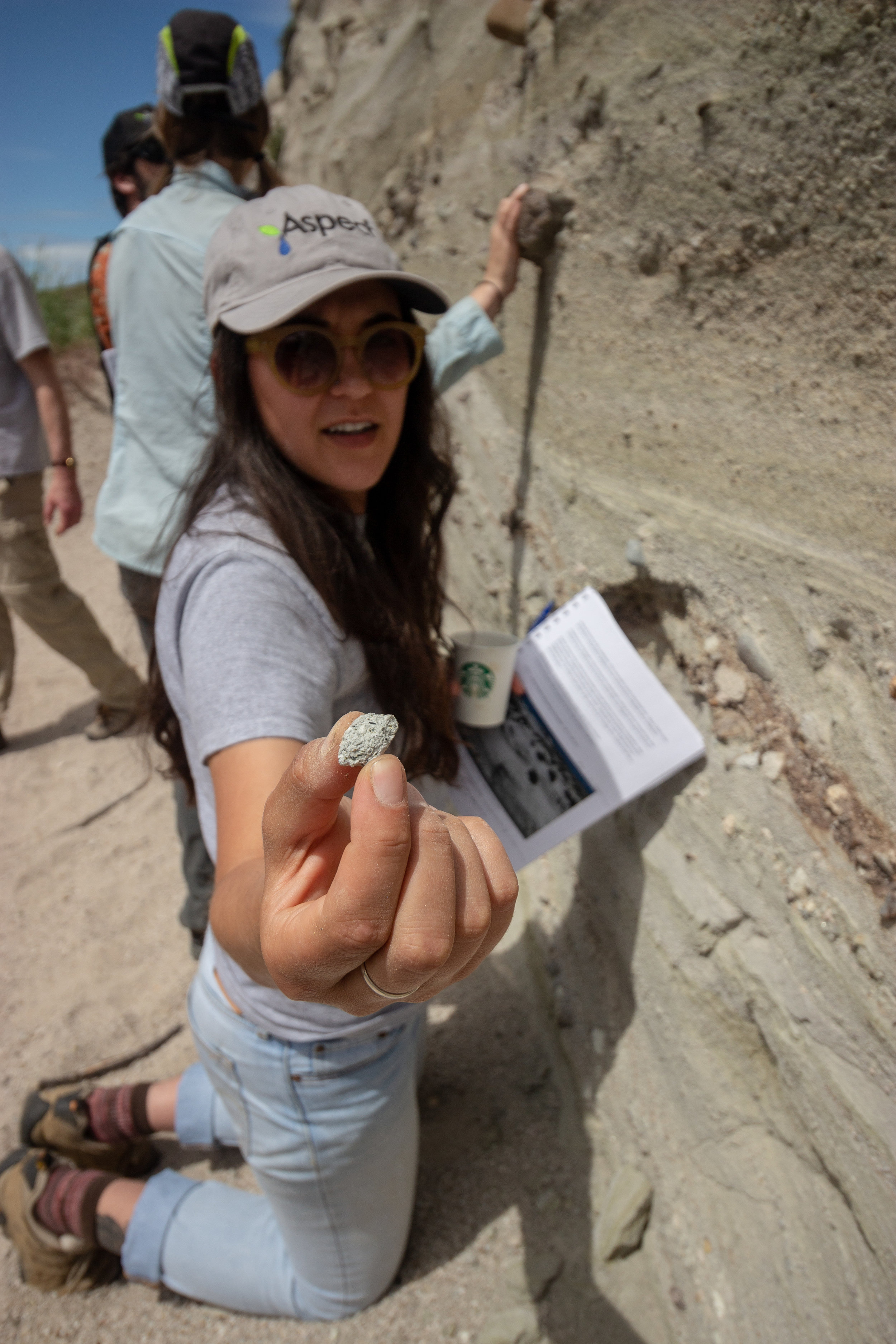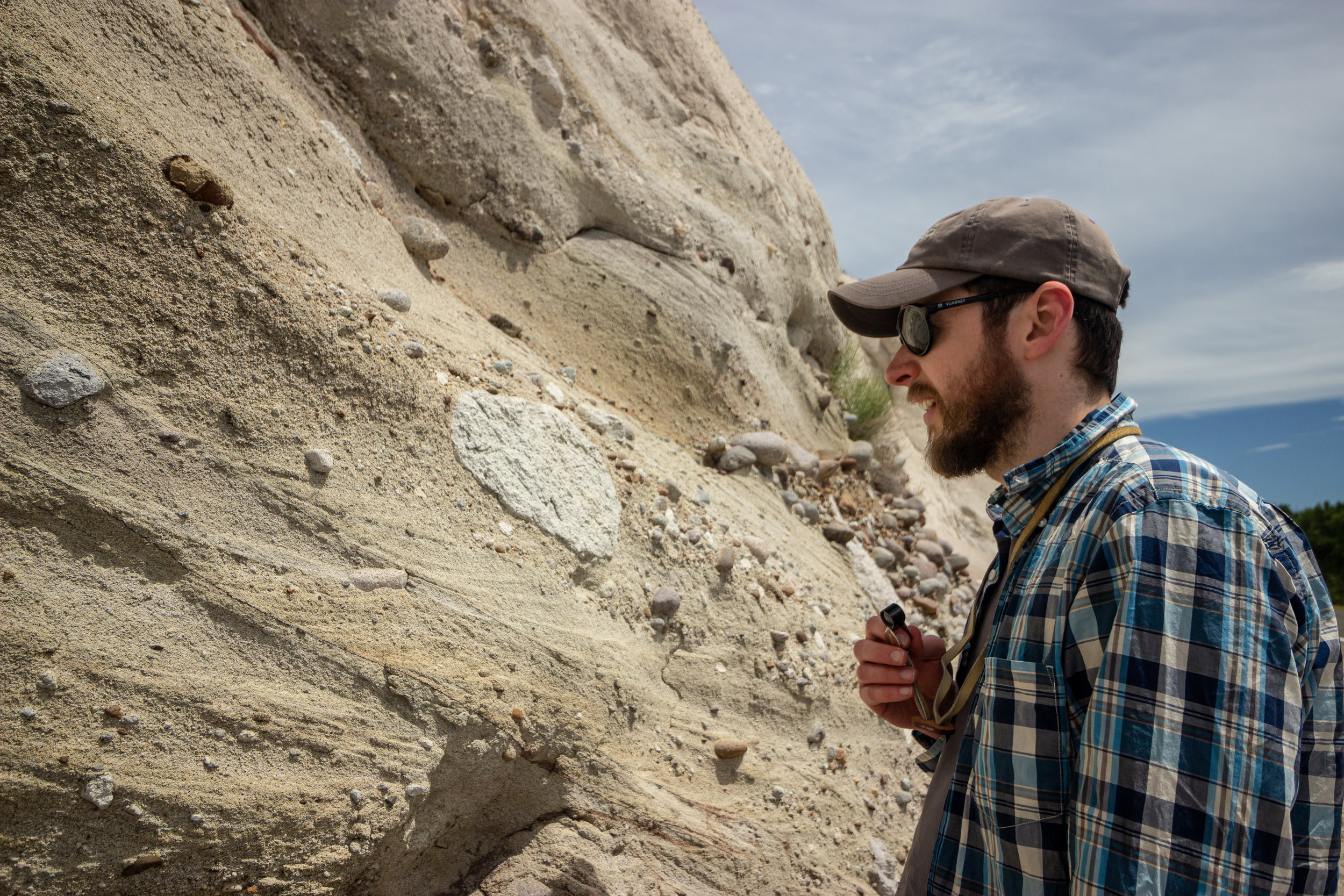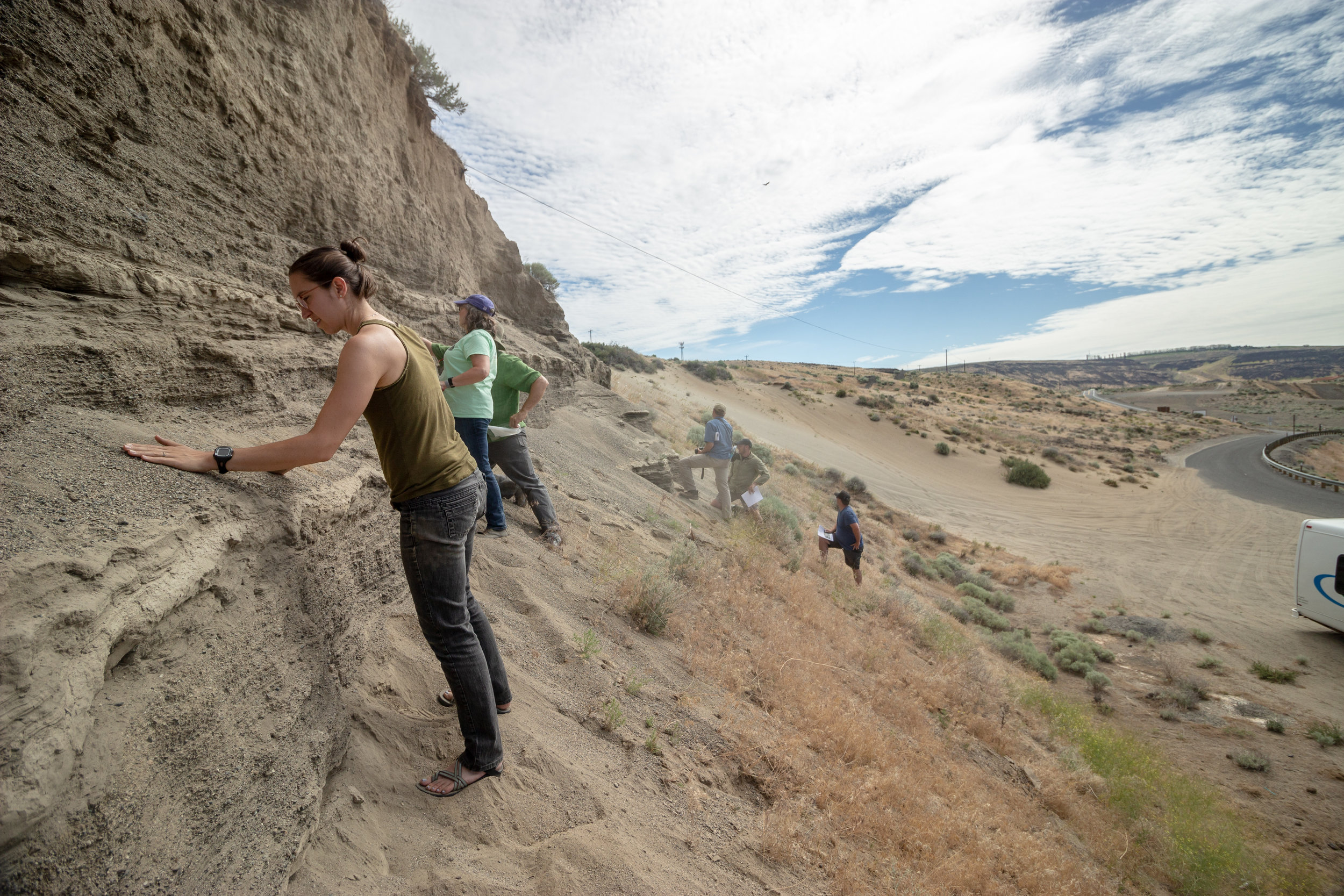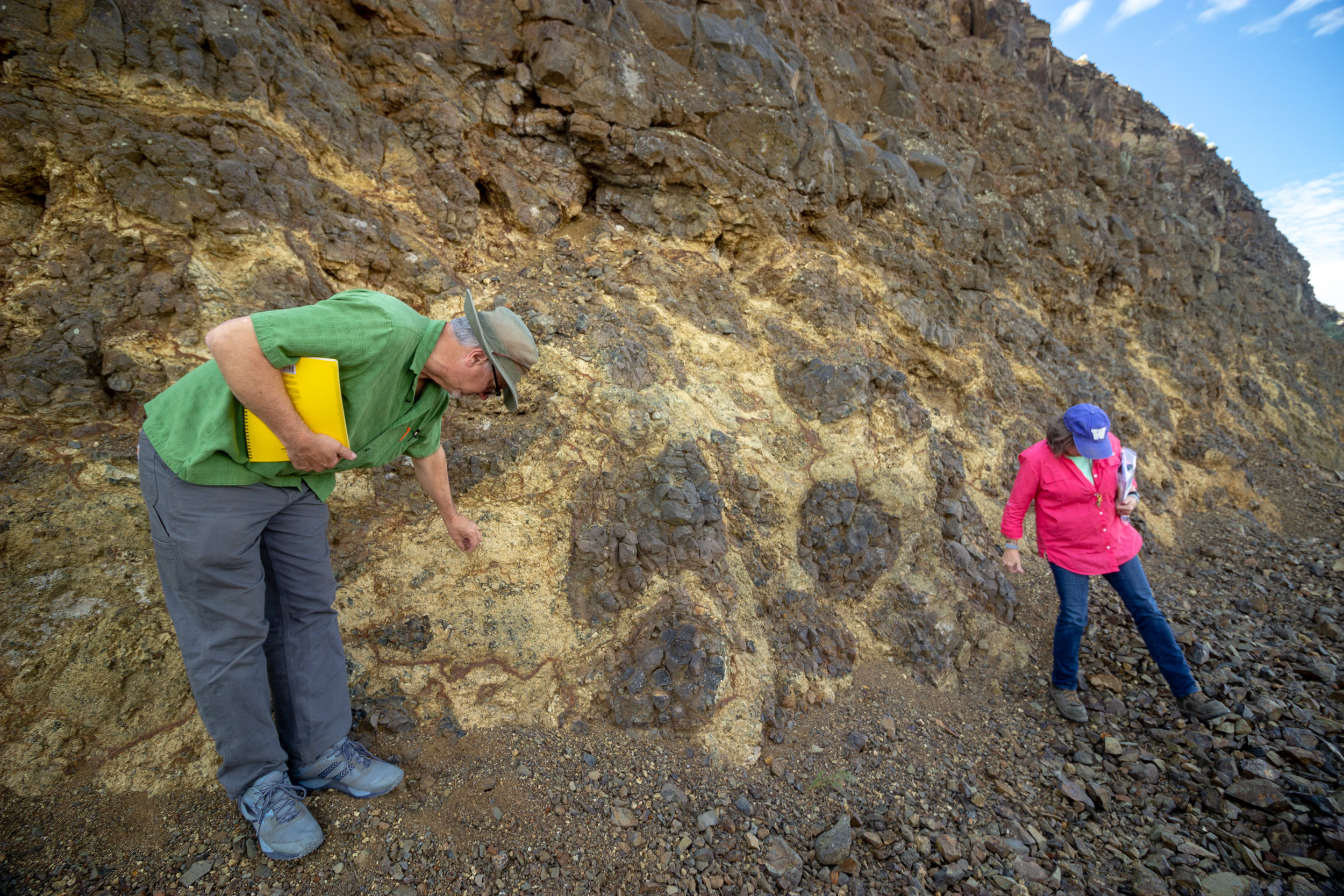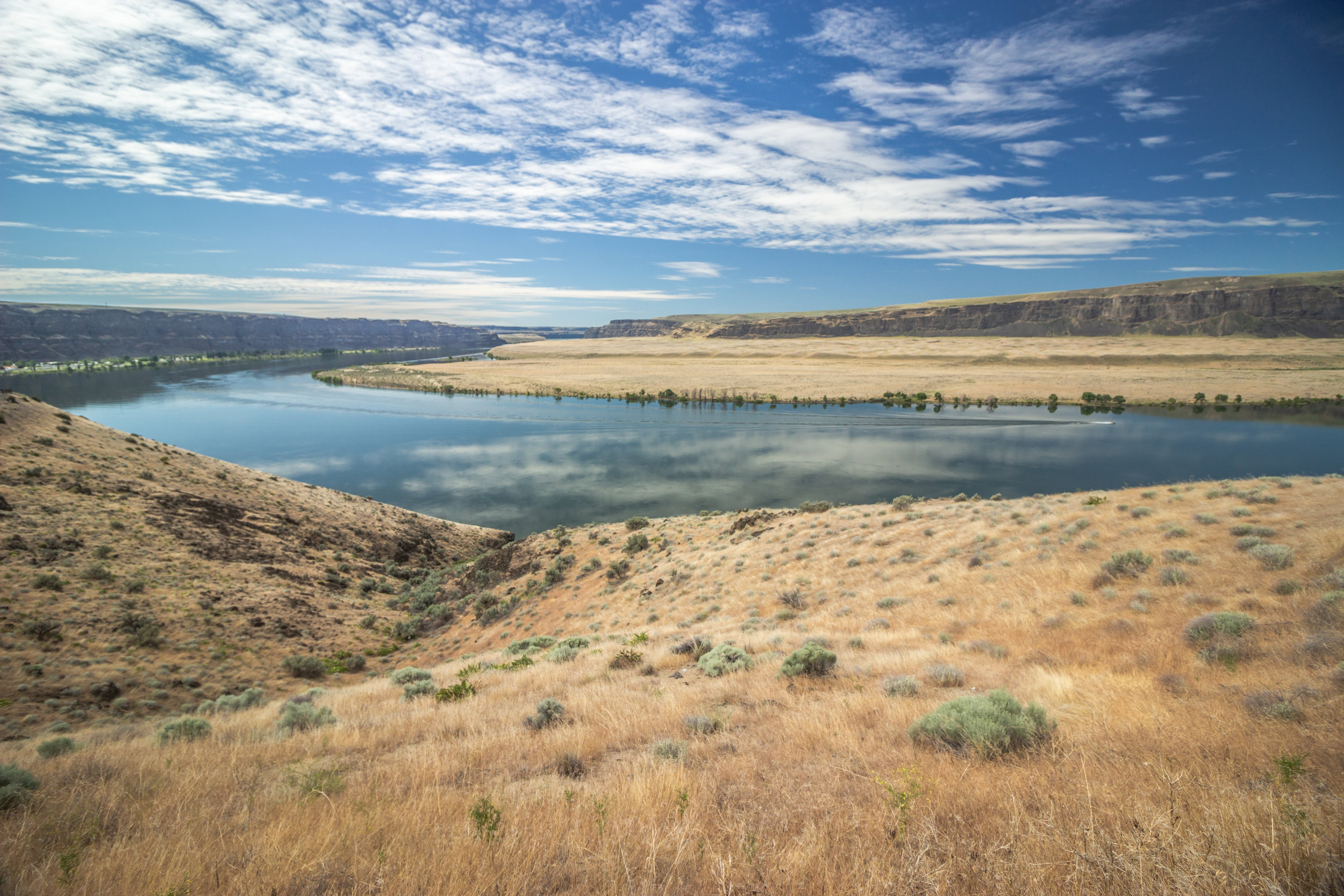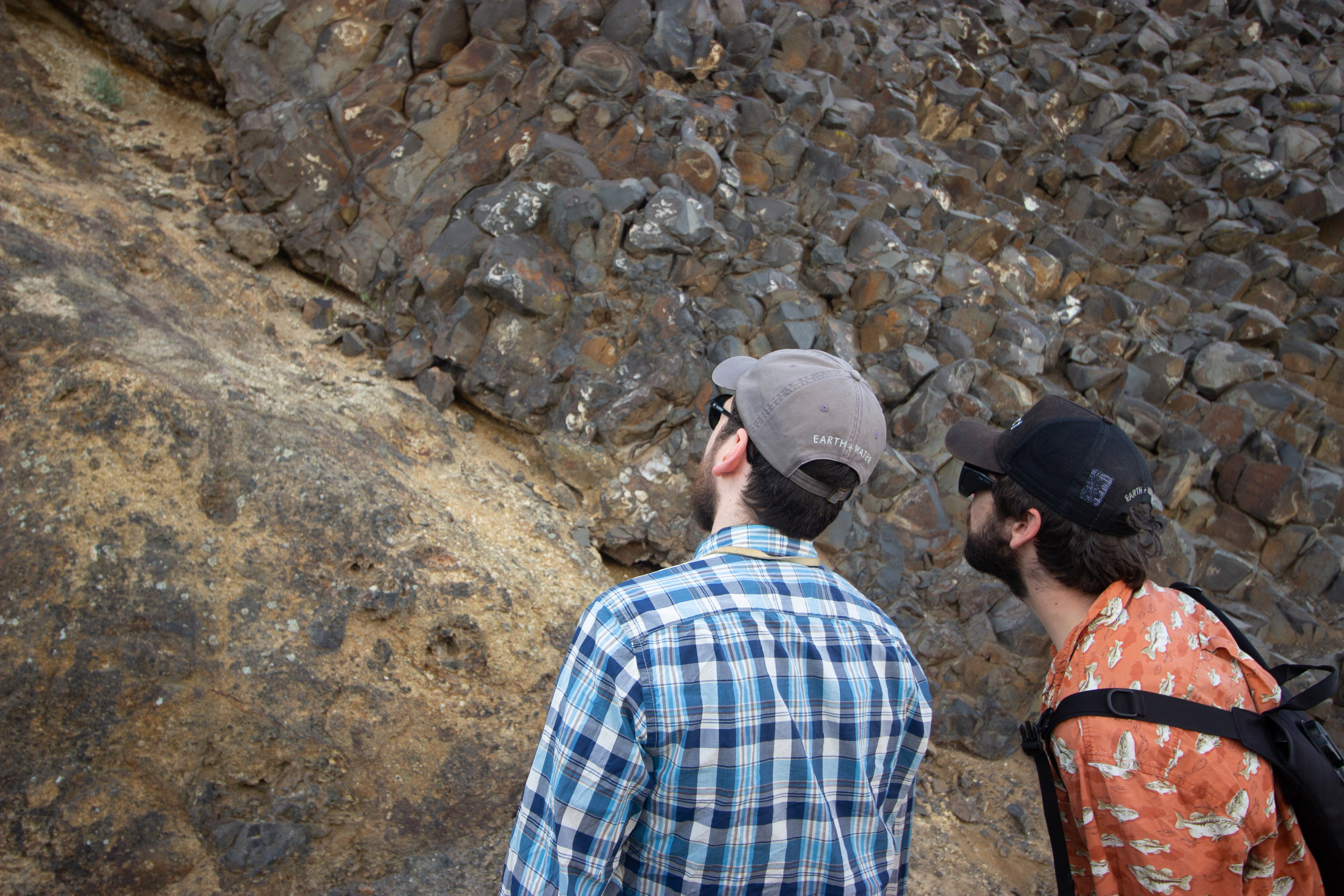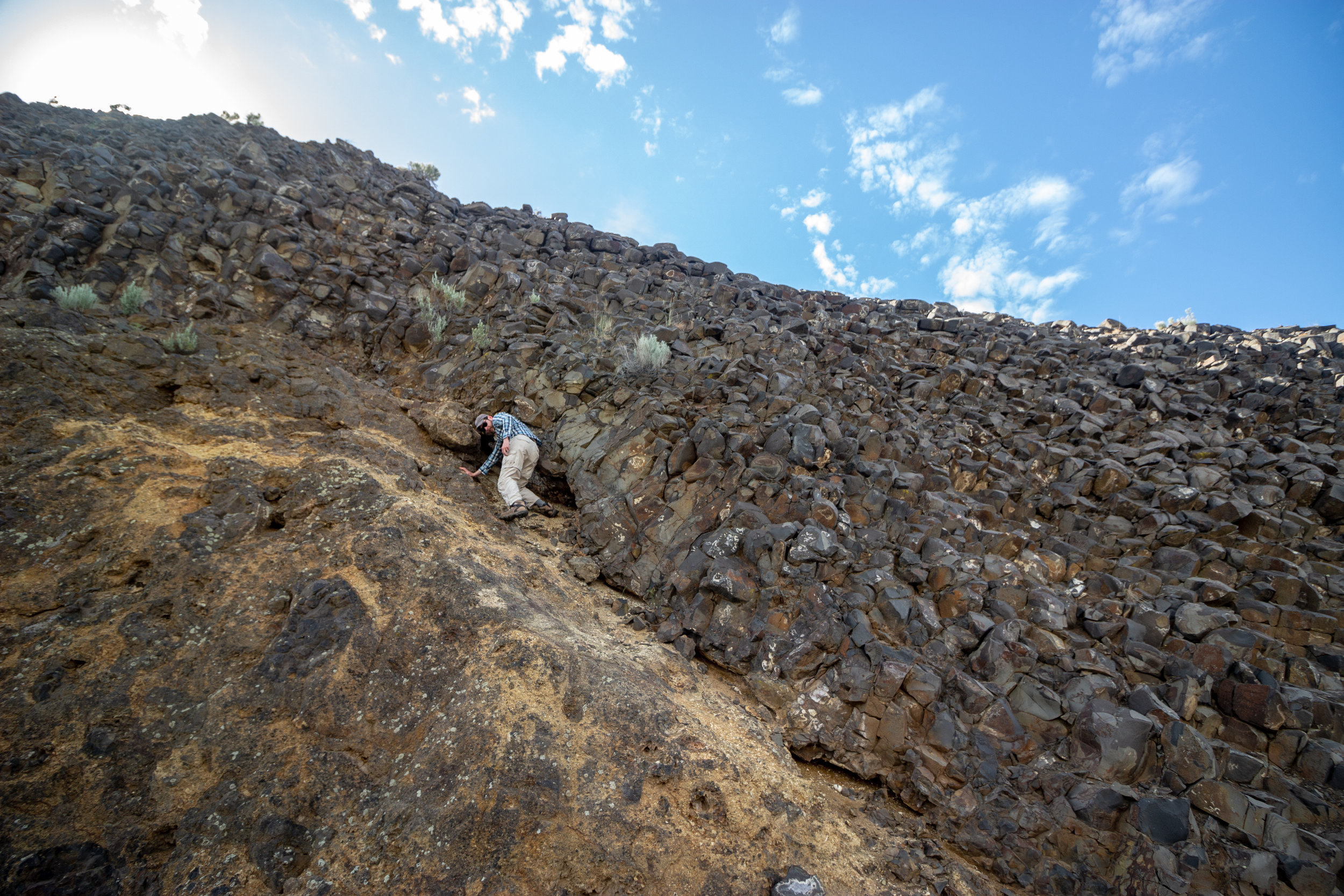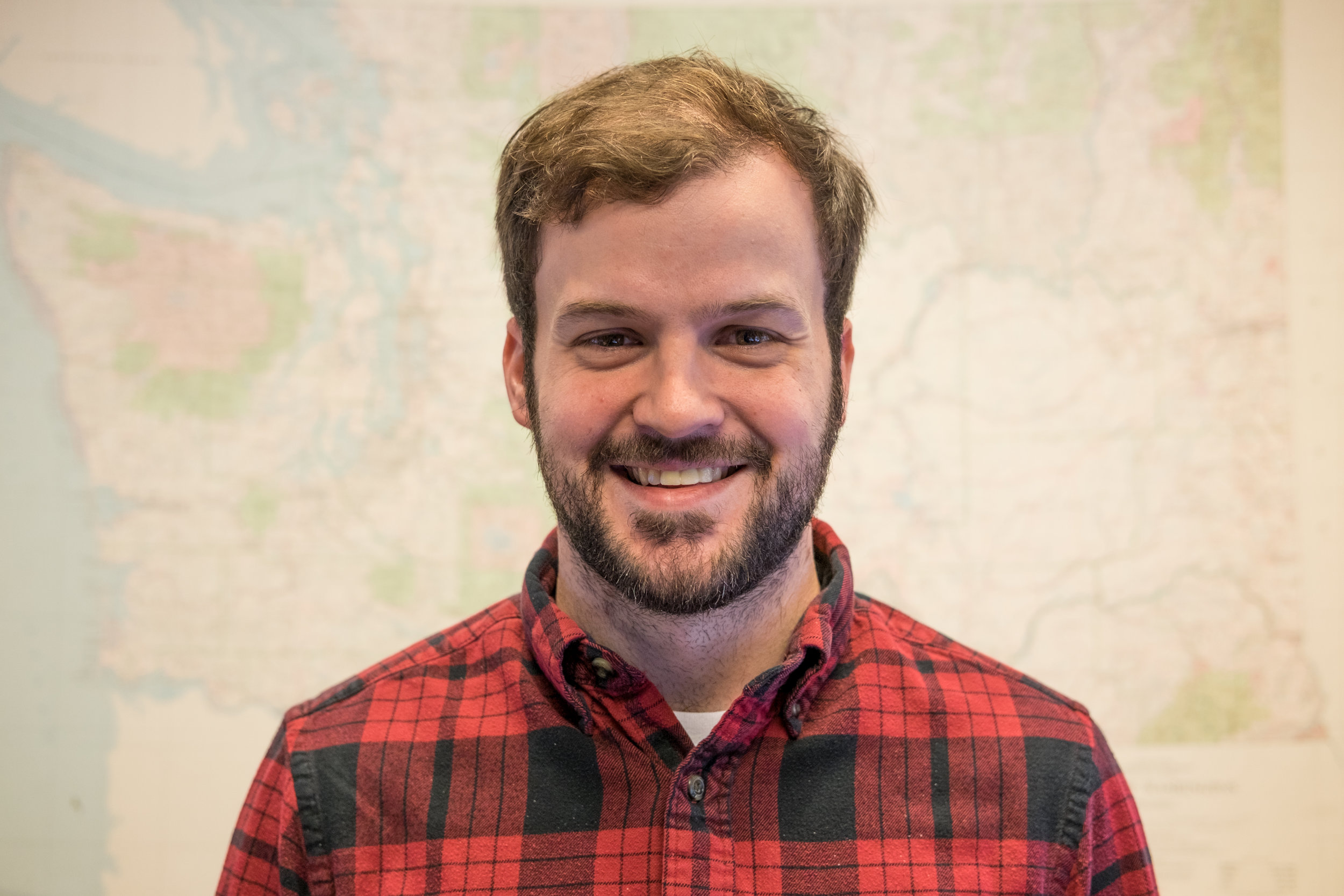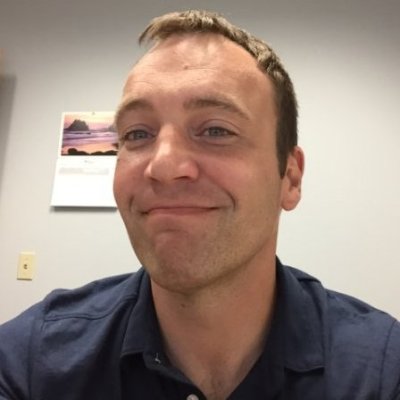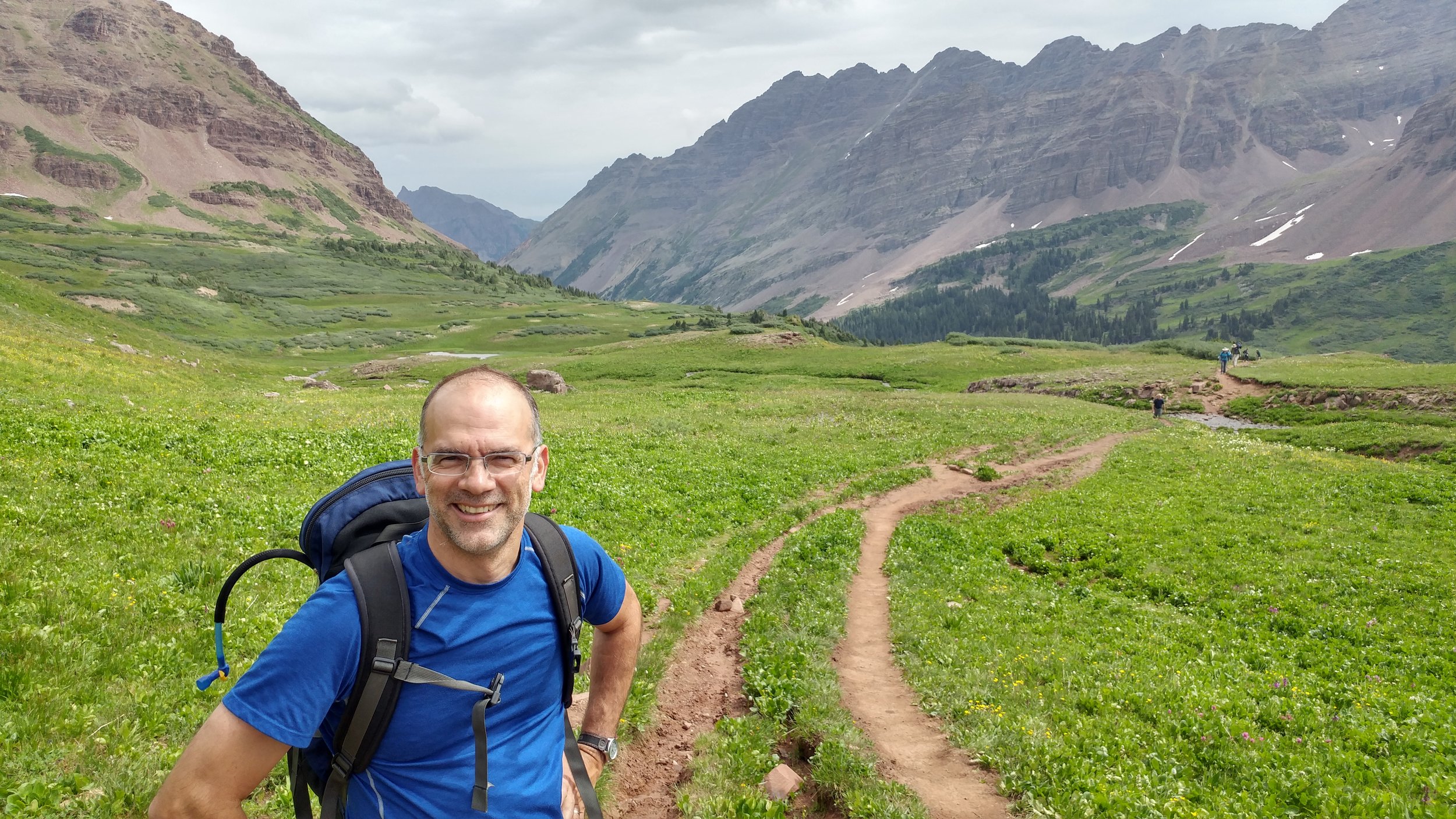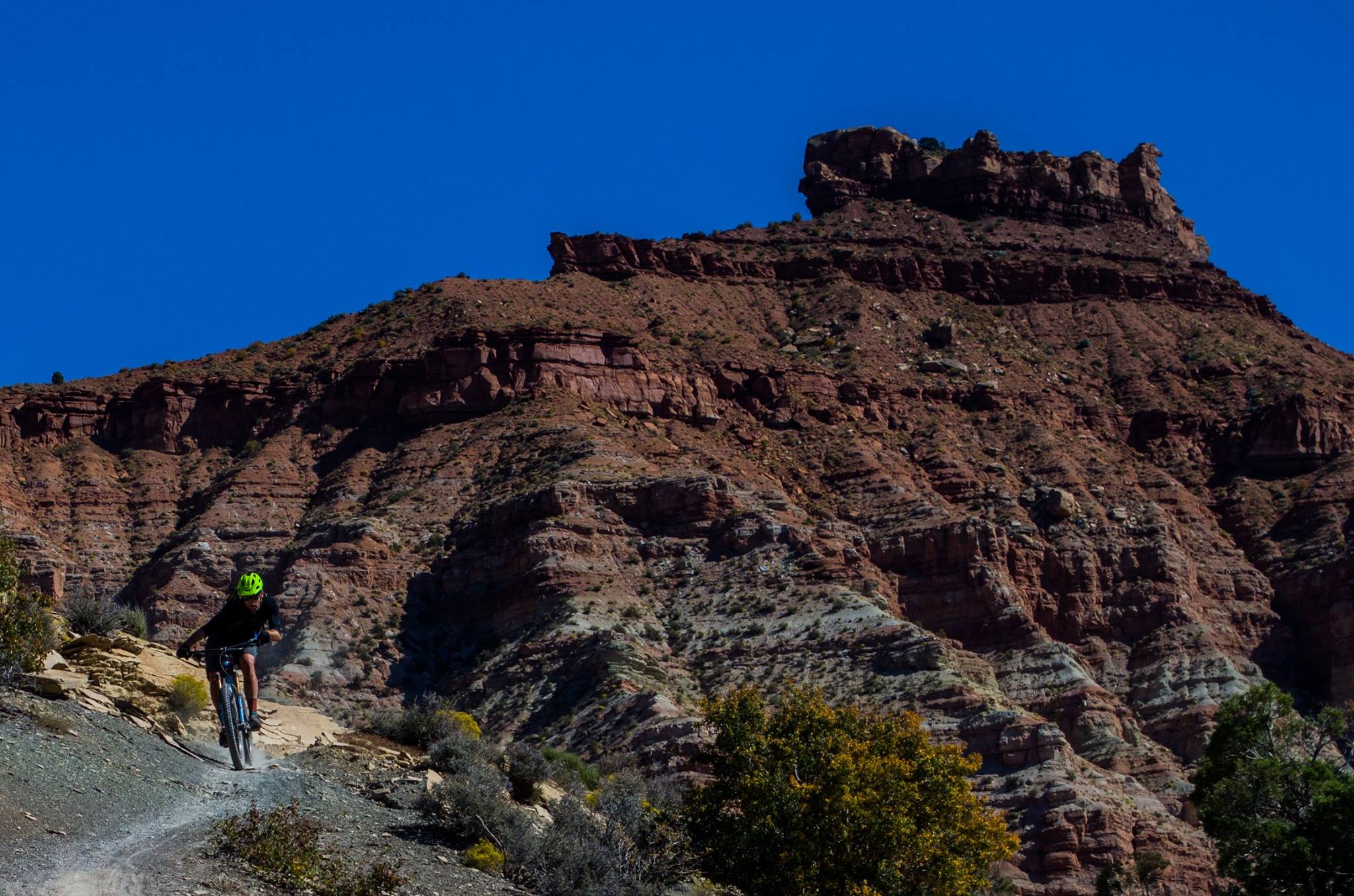On September 18, join Aspect’s Dave Cook and Perkins Coie’s Mike Dunning as they share their experience developing innovative ways to reclaim brownfields for affordable housing. Dave and Mike will be joined by representatives from project partner agencies Mt. Baker Housing Association and the Washington State Department of Ecology in discussing Mt Baker Housing’s The Maddux – a two-building development with 144 apartments affordable to people earning up to 60 percent of the area median income. This project was made possible by implementing innovative cleanup solutions and identifying creative funding mechanisms. Learn More Here.
Meet Bill Grimm and Isabellah von Trapp
Staff Scientist Bill Grimm and Staff Scientist Isabellah von Trapp recently joined Aspect -- Bill in our Bainbridge office and Isabellah in our Seattle office. Here are five questions we asked to get to know them better.
Bill Grimm, Staff Scientist
- Where are you from? If you’re not from the Pacific Northwest, what brought you here?
I’m from the suburbs of Chicago originally. I came to Seattle a little over a year after graduating from college to do a master’s program in applied geosciences at the University of Washington. My master’s program was a great fit for me, because it combined two of my passions: earth science, and giving back to the communities in which I live. Seattle, and the Pacific Northwest in general, are incredibly interesting geologically, and the program presented a great opportunity to study real earth science-related issues happening in our own backyards.
- What inspired you to pursue geology? What made you curious about it?
I really fell in love with geology when I was on a family vacation to the Grand Canyon when I was about 10 years old. I had always loved maps and cross sections since I was a kid, and seeing the Grand Canyon in real life made me absolutely fascinated with the Earth and its natural processes.
- What do you like best about your area of expertise? What excites you and keeps you motivated?
My favorite part of geology is that it’s like a big puzzle. You start with what you know, and you try to fit the pieces together to make the problem make sense. Along the way, you discover new pieces of the puzzle that fit in to the whole, and the more you discover (generally), the clearer the bigger picture becomes.
- What do you like to do when you aren’t working?
I like to hang out with my wife, hike, play guitar, ski, and read. I’m also planning to start brewing my own beer sometime soon.
- Where in the world would you like to travel next?
I would love to do a trek from northern India through Nepal to the Mt. Everest base camp. I love knowing where I am in the world geologically and geographically and being able to picture myself on a map, and I think it would be awesome to walk from the flats in India across the plate boundary and all the way to the base of the highest mountain above sea level.
Isabellah von Trapp, Staff Scientist
Isabellah enjoying Death Valley geology.
- Where are you from? If you’re not from the Pacific Northwest, what brought you here?
I grew up in Salem, Oregon but I always knew I wanted to live in the Puget Sound-area. I attended college in Tacoma at PLU then set out for grad school in Missoula, Montana. But, after a couple years of cold-ish winters, I was ready to head back to my beloved, rainy PNW where I could easily access the mountains, ocean, and my family within a short arm’s reach.
- What inspired you to pursue water resources? What made you curious about it?
For most of my growing up years, I strongly believed I wanted to be a dentist…but after about 1 semester in college, I quickly realized that was not the life for me. After floundering around in some general education classes the following semester, I decided to take an introductory-level geoscience class and my mind was blown.
Soon thereafter, I declared myself as a geoscience major. I took a wide array of geology classes but out of all of them, I loved hydrogeology and geochemistry the most. After that, it only seemed natural to seek out a master’s thesis project where I could combine both of those things! Fortunately, I’ve been able to pursue a career that allows me to use those skills and develop new ones.
- What do you like best about your area of expertise? What excites you and keeps you motivated?
Everybody needs water. Working in water resources is not only interesting but it allows me to solve real world problems that affect a lot of people. Any job that allows you to simultaneously do science and help people is a cool one in my book.
- What do you like to do when you aren’t working?
Most of the time, I’m daydreaming about what I’m going to eat next. So, in my free time I enjoy perusing every item at Trader Joe’s, cooking, and baking. Aside from that – I also love to camp, hike, swim, knit, try out new beers, and travel just about anywhere!
- Where in the world would you like to travel next?
Iceland, Ireland, and Israel – apparently I have a thing for countries starting with the letter I.
Meet Chad Hearn and Jason Yabandeh
Project Engineer Chad Hearn and Staff Data Scientist/Chemist Jason Yabandeh both recently joined Aspect's Seattle office. Here are five questions we asked to get to know them better.
Chad Hearn - Project Engineer
Chad and baby llama in Colca Canyon, Peru.
- Where are you from? If you’re not from the Pacific Northwest, what brought you here?
I grew up in Charleston, South Carolina. It was such a beautiful and fun place to grow up, and a great place to visit if you get a chance. After school, I lived in North Carolina before venturing this way. There’s so much that drew me here! If I had to pinpoint a few things it would be the climate, the Puget Sound, and the energy around outdoor activities like biking, skiing, and just getting out in the mountains. And I’m pretty sure we have the best summer weather in the country!
- What inspired you to pursue environmental consulting and remediation?
I think it was a pretty natural fit with my desire to have a hand in improving where we live and being motivated by helping others succeed. Remediation projects have tended to provide a lot of variety in the work side of the balance. Every site has its unique challenges and keeps you on your toes. There’s always a good learning experience to be had.
- What excites you and keeps you motivated?
It’s quite rewarding at the end of the day when you can say you’ve helped keep someone’s water supply clean, or maybe you just helped a client find a way to tackle a problem. I get really excited when I can help someone else look good. Environmental regulations, just like everything else around us, are constantly evolving. It’s exciting to have a hand in finding new ways to achieve outcomes that are better for everyone.
- What do you like to do when you aren’t working?
Shocker alert; when I’m not working I’m doing my best to explore the PNW and enjoy the outdoors. These days it’s mostly weekend camping trips with the pup, biking, skiing, reading, occasionally squeezing in a round of golf, and if I’m lucky catching a surf session along the frigid Pacific coast. And when I’m able to find some extended time off, travelling somewhere new is always a priority.
- Where in the world would you like to travel next? Where would your dream house be located?
Perhaps this is one of the reasons I like to travel to new places. How do you pick a place for a dream house when you’ve only caught a glimpse of the possibilities? Hopefully one day I find one. Until then…the criteria would have to be somewhere with a breeze, perhaps on a cliff overlooking an ocean (one that I can somewhat manageably get down to beach from), with mountains nearby, decent surf to keep me active and in the water, and maybe even have space for an organic farm and garden so I don’t have to sit in a car that will then be driving me to a grocery store on its own.
Jason Yabandeh - Staff Data Scientist/Chemist
At a Darrington, Washington farm with Bob (grey) and Howard (orange).
- Where are you from? If you’re not from the Pacific Northwest, what brought you here? I’ve lived in the Puget Sound area for my whole life, which is great because I love this little corner of the world.
- What inspired you to pursue data management? What made you curious about it?While my background is in chemistry, I was drawn to data management by an appreciation of its power. Everything we do in work and life involves data and having good control and understanding of that data is key in making accurate conclusions.
- What do you like best about your area of expertise? What excites you and keeps you motivated? Working in data allows me to get involved with many different interesting projects. It’s fun to learn about a site and then play with the data and see trends in contaminant concentrations -- which are hopefully on the decline! It’s also a great excuse to practice programming.
- What do you like to do when you aren’t working? I’ll take any chance I can get to go running, biking, hiking, or swimming with my two dogs. They are great training buddies for the Spartan races that I like to run every year. Besides the outdoorsy stuff, I really enjoy getting a few friends together for some games of the video or board variety. The current favourites are Mario Kart 8 Deluxe and Word Slam.
- If you could be with any musical artist living or dead, who would it be?
Definitely Queen. Not even necessarily to perform with them, as it would be an obvious understatement to say that my musical abilities pale in comparison, but just so I could bask in their glory.
Aspect’s Henry Haselton and Dave McCormack Join October Landslide Seminar
Aspect’s Principal Geotechnical Engineer Henry Haselton and Principal Engineering Geologist Dave McCormack will participate as faculty at The Seminar Group's Landslides program on October 25, 2018 at the Washington Athletic Club in Seattle. This seminar covers the science behind slope movement and landslides in Washington and discusses the liability concerns for a wide audience of attorneys, claims professionals, and real estate experts.
Designing Stormwater Runoff Solutions for Puget Sound Industry
In July's Storm Water Solutions magazine, Aspect's Tom Atkins writes about the challenge and successful problem-solving approach taken to help a Puget Sound industrial client meet stormwater runoff benchmarks to protect water quality in Seattle's Elliott Bay.
Read the story here: https://www.estormwater.com/meeting-benchmarks
Meet Hannah McDonough and Taylor Rulien
Staff Geologist Hannah McDonough and GIS Analyst Taylor Rulien recently joined our Seattle office. Here are five questions we asked to get to know them better.
Hannah McDonough - Staff Geologist
Hannah sailing in the Puget Sound
- Where are you from? If you’re not from the Pacific Northwest, what brought you here?
I grew up in a log cabin on a dirt road in Vermont. As a kid, I cross-country skied, hiked, and tapped maple trees right outside my front door. I gained an appreciation for the natural world, which led me to study geology at the University of Rochester in New York. During field camp in Wyoming, I realized that I needed to be in the west to get a better sense of active geology. I went on to study at Utah State University and eventually found work in environmental consulting. I’ve stayed for the sushi, mountains, and water.
- What inspired you to pursue geology?
On a field trip in high school, we visited a local mountain and observed glacial striations in the large granitic bedrock. I was so taken by the power of earth’s movements around me, that I had to figure out how this happened and what other wonders are out there to explore. I felt right at home in the geology department since we got to dig up fossils and hike out to coal mines in Pennsylvania.
- What do you like best about your area of expertise?
I am drawn to the results of environmental consulting. It is very rewarding to work on projects across the state and a few years later point out, “that’s a place where I made a small improvement in this corner of the world.” I also enjoy the travel. I’ve seen more of Washington State during site visits than some locals see in a lifetime. It’s a great way to learn more about this dynamic state.
- What do you like to do when you aren’t working?
I took a year off from consulting and delved into the sailing world. I enjoy harnessing the power of the wind to explore new places and familiar places from a new perspective. I am also an amateur violinist, and love to jam with friends and family.
- If you could be onstage with any musical artist living or dead, who would it be?
Andrew Bird is my musical hero. It’d be a dream to be on stage fiddling and whistling with him.
Taylor Rulien - GIS Analyst
Taylor lounging on the north ridge of Mt. Stuart in Washington's central Cascades
- Where are you from? If you’re not from the Pacific Northwest, what brought you here?
I was born and raised in Alaska, this gave me a love for the outdoors but also a need to explore different states due to the isolation. I’ve since lived across the West from Oregon, California, Colorado, and now Washington. Washington has hit a good balance for me between the excitement of having a large city to the vast mountainous wilderness – I plan on calling this place home for a long time.
- What inspired you to pursue GIS?
I’ve always been fascinated by maps and GIS is a great way to keep that alive. With the large amount of spatial data available through our smartphones and other devices, there is a growing need and ability for exciting spatial analysis.
- What do you like best about your area of expertise? What excites you and keeps you motivated?
GIS is such a broad discipline, this allows me to continue to learn different skillsets from automation through programming, cartography, application development, and more complicated analysis.
- What do you like to do when you aren’t working?
I like doing anything in the outdoors. You’ll find me either climbing rocks, ice, or trail running in the mountains and enjoying a post IPA and burger at the closest brewery. Let me know if you are ever interested in an outdoor activity!
- Where in the world would you like to travel next?
There are dozens of places that I would love to travel to in the world but going back to Spain might be the most realistic and exciting for me. There are numerous world class climbing destinations!
Washington's Healthy Housing Program Helps Fund Cleanup for Affordable Housing
Today, the Seattle Daily Journal of Commerce (DJC) published a great overview of the new Washington State Healthy Housing Program and the inspiration for the program - Mt. Baker Housing's $55 million Maddux project. Check it out.
Does your firm want help turning brownfields into affordable units?
Ecology wants to offer grants to get brownfields cleaned up and reused, and is seeking applications from developers until Saturday.
By BENJAMIN MINNICK
Journal Construction Editor
There are thousands of blighted properties across the state that could be redeveloped to create more affordable housing, but contamination on these sites has mostly kept developers at bay.
Now the state and its consultants are testing a way to get more of these sites developed. The Healthy Housing Remediation Program provides grants to help affordable housing developers build on brownfields.
The departments of Ecology and Commerce created the program. To gauge interest, they are seeking applications from developers until Saturday. The list of firms that respond will be used to develop Ecology's 2019–21 cleanup budget plan and to demonstrate funding needs for the Legislature to consider during the 2019 session.
Dave Cook of Aspect Consulting, one of the consulting firms, said affordable housing developers face high property costs, water rights issues and Growth Management Act restraints. He said this program will help fund remedial investigation studies and site cleanup to make blighted properties more attractive to developers.
The program was inspired by Mt. Baker Housing's $55 million Maddux project, which is slated for a site on South McClellan Street, east of Martin Luther King Jr. Way South and near the Mount Baker light rail station.
Maddux will have two buildings with 144 apartments that are affordable to people earning up to 60 percent of the area median income. Nearly half of the units will be “family-size,” with two- and three-bedroom layouts.
Mt. Baker Housing will use $6.2 million in state funds to clean up contamination from a gas station and dry cleaner. The nonprofit signed an agreement last year with Ecology that lays out the cleanup plan, and Ecology provided $400,000 for initial studies.
“We've been in the Mount Baker neighborhood a long time and these five properties always intrigued us — but we knew conventional options to develop the site were limited,” said Conor Hansen, director of real estate at Mt. Baker Housing, in a news release. “Once we learned about the opportunity to work with the Department of Ecology and play a part in creating a new innovative model, we believed this site would be the perfect candidate to clean up, develop and activate a prominent intersection that will serve as a catalyst for the neighborhood and provide much-needed affordable housing near light rail.”
In early 2017, the city designated the five properties as a Redevelopment Opportunity Zone, which allows state funds to flow directly to Mt. Baker Housing for remediation.
The parcels total about a half-acre.
Mt. Baker Housing aims to select a general contractor shortly, and break ground in late 2019 and open in early 2021. Other team members are architect Mithun, development consultant Beacon Development Group and acquisition lender Impact Capital.
Cook said it will be two months before all the data is available about the site contamination, but it's “very contaminated.”
Aspect and law firm Perkins Coie led the environmental team for Mt. Baker Housing, and worked with Ecology on the pilot program.
Cook said Aspect and Perkins Coie can help interested developers with the pilot program's application process.
Central-Washington Geology: Field Trip!
Rocks have histories and their histories tell us stories.
This was the underlying theme of Aspect’s recent seminar on central Washington geology, led by esteemed experts Dr. Kathy Troost, LG, of Troost Geosciences and the University of Washington and Dr. Eric Cheney, Geology Professor Emeritus at UW. While topography alone makes clear the relevance of geology to the eastern Washington landscape, less sure is how the regional setting impacts the realm of projects—those distinct points on and below the ground where Aspect’s earth science and engineering work enters in.
Over two days in June, staff from across Aspect’s offices came together to learn about big-picture geology and earth processes related to 66 million years of local history, and then travel to the outcrops to see the deposits firsthand. Woven throughout were the contributions of each person’s unique experiences with geology and relevant insights from nearby project sites. Together, the balance provided each of us the tools to make sense of an otherwise complex landscape; a way to break it down into manageable pieces, put it back together, and learn what it has to tell.
Learn about Washington Water Law
Aspect’s water law expert, Dan Haller, will be presenting on Water Banking for Agricultural Water Supplies at the 27th Annual Water Law in Washington conference (June 14-15). This year’s conference focuses on major legislative changes, new case law, and important practical information for water rights and resource management in the State of Washington.
Meet Jon Turk and James Bush!
Associate Hydrogeologist Jon Turk, LHG and Project Hydrogeologist James Bush, LHG recently joined Aspect's Water Resources practice supporting our Seattle office. Here are five questions we asked to get to know them better.
Jon Turk - Associate Hydrogeologist
Jon and family kayaking near Elephant Island at the Bai Tu Long Bay World Heritage Site in Vietnam.
- Where are you from? If you’re not from the Pacific Northwest, what brought you here?
I was born, raised, and educated in Ohio. I worked in Ohio for a few years, then transferred down to Florida for a previous firm. A few years in Florida was enough for the cravings of mountains and snow to take over. I’ve been in Olympia for about 9 years and consider it home.
- What inspired you to pursue hydrogeology? What made you curious about it?
My early childhood was spent on the Chagrin River, near Cleveland, with a short walk to shale and cliffs and fossils to collect. It was in the same valley that my grandparents homesteaded, and where my mother grew up…so maybe you could say I was born into it. Some of my earliest childhood memories are rock collecting along the river and sliding down the waterfalls. I started rock climbing as a teenager, and yet somehow started college as a pre-law student. After my first year, I switched majors and haven’t given anything else a second thought.
- What do you like best about your area of expertise? What excites you and keeps you motivated?
It is not so much my area of expertise (quantitative hydrogeology), but consulting in general, that gets me excited. The creative and technical problem solving, rewards of a successful project and happy client, providing value to the communities I work in, are really the most rewarding parts of it for me.
- What do you like to do when you aren’t working?
Any sort of family adventure is at the top of the list. We try to raise our kids in a way that keeps them engaged with us, and consequently have dragged them through some incredible places way off the beaten path. We enjoy the outdoors as much as possible, climbing, cycling, kayaking, fishing, and traveling the world experiencing new cultures. I do some volunteer work with the WaYa Outdoor Institute, a non-profit summer day camp founded by my wife and friends, that combines STEM curriculum with outdoor adventure. I’m also an avid DIYer and roughly half way through a 5-year plan of complete home renovations.
- Where in the world would you like to travel next?
The next “big” trip we are planning will be in summer of 2019 to Nepal, Tibet, and Sri Lanka. However, my dream trip would be to spend some time down in Patagonia, then hop on a cruise to Antarctica. I hope to see a narwhal at some point in my life—they really are the closest living thing to a unicorn you know.
James Bush - Project Hydrogeologist
- Where are you from? If you’re not from the Pacific Northwest, what brought you here?
I grew up in the Boise, Idaho area. It’s a place I really love, and one where I felt like I had a lot of opportunities. I moved to Washington seven years ago for the opportunity to practice hydrogeology with some talented folks, and it’s worked out really well.
- What inspired you to pursue hydrogeology? What made you curious about it?
My hometown (Eagle, Idaho) is fairly arid and very dependent on groundwater, so folks started to worry about water when the area began to undergo a population boom. I knew that I wanted to be a scientist who did work that had a direct impact on the community around me. Water is a resource for which there are no substitutes, so hydrogeology was a great fit for me.
- What do you like best about your area of expertise? What excites you and keeps you motivated?
The wide range in scale on which my work has an impact. Water is so connected across space and time, and it touches everyone’s lives in so many places. It’s invigorating and daunting when I think about how my work today will affect folks potentially many miles downstream and many years into the future.
Day-to-day, I love the investigative nature of hydrogeology. Working out how to evaluate a resource that is mostly hidden in an efficient manner makes me feel like Sherlock Holmes on a case. Bringing together sparse information to make deductions and piece together an accurate picture gets me out of bed in the morning.
- What do you like to do when you aren’t working?
My nights are usually taken up by rec league softball or volleyball. I’ve played baseball and softball since I was small, and being out on the diamond with friends on a summer night can’t be beat. I just got into volleyball last year, and learning an entirely new sport has been the best sort of challenge. I’ve also rediscovered my love of skiing the past few winters, and can’t wait until next season!
- Where in the world would you like to travel next?
In all seriousness I’m hoping that commercial spaceflight takes off in my lifetime. Seeing the Earth from space, experiencing microgravity, and seeing the stars without the atmosphere are things I couldn’t pass up if the opportunity every comes!
Strengthening our Water Resources Services with Jon Turk and James Bush
Aspect strengthens its water resources practice with the addition of Associate Hydrogeologist Jon Turk, LHG and Project Hydrogeologist James Bush, LHG. Jon is a hydrogeologist with over 16 years of experience focused on quantitative hydrogeology for water, wastewater, and industrial markets for public agencies and private industry. He will work out of Olympia, supporting Aspect’s Seattle office as well as expanding Aspect’s capabilities for clients in the south Puget Sound area. James brings over seven years of hydrogeologic and numerical modeling experience for groundwater projects.
Jon Turk
James Bush
“Jon’s background and expertise are a seamless match with Aspect’s water resources client base,” says Tim Flynn, Aspect’s President. “We’re also excited to continue to introduce Aspect to all the south Puget Sound and western Washington clients that Jon has built strong relationships with.”
While at his previous firm, Brown and Caldwell, Jon led an integrated water resources management team providing regional leadership and national consulting for complex and integrated surface water and groundwater systems. He brings recognized skill in groundwater recharge, water supply management, wastewater reuse, and numerical modeling for clean water projects as well as site remediation support for Brownfields and Superfund projects. James also comes from Brown and Caldwell, where he was a primary technical contributor to groundwater projects, environmental site characterization, and numerical modeling projects throughout Washington, Oregon, and the western United States.
“I’m excited to join the Aspect team and proud to join such a talented group of consultants,” says Jon. “I’ve always considered Aspect as one of the premier hydrogeologic consultancies in the region, with a strong brand that truly values both innovative and practical approaches to solving complex water resource challenges.”
Meet Mike Mills
Mike Mills recently joined Aspect's Portland, Oregon office. Here are five questions we asked to get to know him better.
Mike Mills, Project Software Developer
1. Where are you from? If you’re not from the Pacific Northwest, what brought you here?
I was born in Portland Oregon, but grew up in Sisters, Oregon (just north of Bend).
2. What inspired you to pursue software development? What made you curious about it?
I learned how to code my freshman year of high school and from then on knew exactly what I wanted to do with my professional life.
3. What do you like best about your area of expertise? What excites you and keeps you motivated?
I really enjoy solving complex problems, which coding allows me to do with ease. The thing that excites me the most is to finish a project and have a client be completely satisfied with the work that’s been done.
4. What do you like to do when you aren’t working?
When I‘m not working, I enjoy running around the Portland waterfront and reading with my wife. I also enjoy salmon fishing every season with my Dad and Mom in Newport, Oregon.
5. Where in the world would you like to travel next?
After visiting Italy this last October, I would love to go back to Europe and visit either France or Spain. My wife speaks French, so that would be a bonus having a translator.
Meet Chris Bellusci and Blair Deaver
Chris Bellusci and Blair Deaver recently joined Aspect's Bend, Oregon office. Here are five questions we asked to get to know them better.
Chris Bellusci, Associate Business Systems Architect
Chris hiking near the Maroon Bells -- two peaks in the Elk Mountains in Colorado.
1. Where are you from? If you’re not from the Pacific Northwest, what brought you here?
I was born and raised in Missoula, Montana on a small ranch, where I developed my love for the outdoors and our natural resources. From Missoula, I moved to Seattle where I spent 10 years going to school, working, and exploring all the great outdoor activity it had to offer. But I felt I needed to get back to something a bit smaller in city size (and more sunshine) so I moved to Bend, Oregon, a place I really call home and have loved it ever since.
2. What inspired you to pursue data infrastructure? What made you curious about it?
My degree is in Electrical Engineering, but my first job right out of school was for Boeing Aerospace where I supported the hardware and software that developed the first design-by-wire aircraft, the 777. I saw the power of how technology can revolutionize an industry or a way of doing business. This set my path into the world of software.
3. What do you like best about your area of expertise? What excites you and keeps you motivated?
My focus is helping industries solve their complex business problems by applying technology solutions. My real belief is business process should drive the technology approach, which is why I enjoy learning so much about our client’s business and helping them to find the best solution to meet their business needs. I believe that applying technology to better manage our natural resources is the next great frontier.
4. What do you like to do when you aren’t working?
Being outside!!! I love Bend because of the four seasons it has to offer and I love being outside in each one of them, whether if it’s 90 degrees in July or 10 degrees in January. Hiking, biking, camping, skiing--I enjoy all of it!
5. Where in the world would you like to travel next?
It has been over 15 years since I have visited Europe and I would like to get back there again this time with our two children. I would like them to see and experience other cultures, plus I have an older brother that lives in London, UK, so a good excuse to go.
Blair Deaver, Senior Geospatial Data Scientist
Blair riding the Jem biking trail in Utah.
1. Where are you from? If you’re not from the Pacific Northwest, what brought you here?
I grew up in Washington, D.C. I fled west for college in search of real mountain ranges I could explore on my mountain bike.
2. What inspired you to pursue GIS and IT? What made you curious about it?
When I was going to school at the University of Oregon I worked part-time for the US Forest Service as a Hydro-technician in Oakridge, OR. I was a seasonal employee with aspirations for a full-time field job. I quickly determined that a full-time job would be difficult. A peer at the time mentioned to me that if he were me, he would learn everything there is to know about this thing called “GIS”. I quickly transitioned much of my school focus to Geography and GIS. I was fascinated by GIS and quickly learned all I could. When I graduated college, I was fortunate to get a job at Esri in Redlands, CA. I went from working in the woods for 10 hours a day to helping Esri customers solve technical problems behind a desk. The transition was a bit rough at first, but I have loved every minute of it.
3. What do you like best about your area of expertise? What excites you and keeps you motivated?
I love the pairing of earth science + technology to solve real problems. I enjoy working with others to focus on the mastery of understanding a problem rather than quickly jumping to an engineering solution. I have worked over 20 years in the geospatial and IT industry. I have seen lots of change in the industry. What motivates me daily is to always keep learning. Being able to design and deliver technology solutions for earth science customers requires technical agility, creativity, and a solid understanding of the problem you are trying to solve.
4. What do you like to do when you aren’t working?
I love being a father and husband. You may also find me riding and racing my bicycle on trails throughout the PNW. I also love trail running and winter sport activities.
5. Where in the world would you like to travel next?
I would love to travel to Africa. All parts of Africa. I better save up my vacation.
Meet Aaron Fitts and Jasmin Jamal!
Aaron Fitts recently joined Aspect's Bellingham office and Jasmin Jamal recently joined Aspect's Portland office. Here are five questions we asked to get to know them better.
Aaron Fitts, LG, Staff Geologist
Aaron and 2 1/2-year-old son Arthur.
- Where are you from? If you’re not from the Pacific Northwest, what brought you here?
I grew up in central Maine. The landscape in Maine and New England is a lot like the Pacific Northwest (PNW), except the mountains are smaller and the winters are colder. I spent all my time growing up in the woods or on the coast; I spent the summers racing bikes, surfing, and whitewater guiding, and in the winter I’d be climbing mountains, snowboarding, and cross-country skiing. It turned out that you could do all these things in the PNW too, but it’s also way more fun here!
- What inspired you to pursue geology?
At the end of my Junior year of college, I had completed most of the requirements for a degree in physics and found myself with just electives left for my senior year. I was a bit sick of being stuck in physics laboratories all the time and saw geology as an opportunity to spend some time outside. I took eight geology courses in one year and was able to get a dual-degree. Ironically, I ended up spending most of my time in a basement geochemistry laboratory, though, I got out enough to make it worth it. I decided that I wanted to go to grad school where I could be in landscapes a bit more exciting than the Northeast. My undergraduate advisor recommended that I contact his colleague at Western Washington University in Bellingham, telling me that it was near the coast but surrounded by mountains. That was literally all I knew about the area when I drove across the country to get here. It ended up being a good decision.
- What excites you and keeps you motivated?
Troubleshooting and problem-solving while working with clients, contractors, and co-workers is my favorite thing about working in this field. There’s something very satisfying about getting something complicated to work out in the end. Getting to do the type of science that I enjoy and seeing cool places at the same time is just a great bonus on top of it all.
- What do you like to do when you aren’t working?
Lately, my favorite activity has been reexperiencing childhood activities with my two boys (11-months and 2.5-years old). My toddler is obsessed with riding his bike and running on the trails and my infant is obsessed with anything his big brother is doing. My wife and I do our best to keep up with them, but they’re a handful. When we do find time for ourselves, we usually end up riding our bikes anyway.
- Where in the world would you like to travel next?
There are a lot of places around the world I’d like to visit; generally, any place with mountains, probably Chile or Argentina. Honestly though, even given the choice, I’d probably most like to just go to the Methow Valley. I really like it there.
Jasmin Jamal, EIT, Staff Engineer
Jasmin at the Trillium Falls near the Redwood National and State Parks in Humboldt County
- Where are you from? If you’re not from the Pacific Northwest, what brought you here?
I am from a city called Orange, in a county called Orange, in a state called California. My life-partner Jonathon and I visited Portland a few years back and immediately agreed that this was where we needed to be. Last summer, I finished grad school, he requested a job transfer, and before we knew it, we landed in Portland!
- What inspired you to pursue environmental engineering? What made you curious about it?
Growing up, my mom frequently took my sisters and me on camping, hiking, and biking adventures. I loved the outdoors as a kid but never imagined pursuing an environmental job as a career--I always wanted to be a teacher. During college, I stumbled upon the earth science program and fell in love. Around the time that I finished my undergrad, environmental engineering was introduced as a master’s program at my university. The variety of topics covered in the program were intriguing, so I went for it and fell in love for the second time! My interest in teaching hasn’t ceased but I envision myself now as more of a grey-haired professor.
- What excites you and keeps you motivated?
I like the diversity behind environmental engineering and am motivated by the fact that the environment is ever changing. I hope to work in multiple areas of interest including wastewater and surface water treatment, solid waste management and design, fate and transport of chemicals, and soil and groundwater remediation.
- What do you like to do when you aren’t working?
I enjoy hiking, biking, and camping, but I probably like all of that as much as I like being horizontal with my cat Carrie.
- What five people would be your dream party guests?
I’m going to pick a mixture of living and dead:
1. My Uncle Tom (deceased)
2. Barack Obama (living)
3. Carrie Brownstein (living)
4. 011 from “Stranger Things” (fictional)
5. John Muir (deceased)
Aspect Talks Water at AWWA Conference
Tim Flynn and Dan Haller will both be presenting Friday April 27th at the AWWA ‘Just Add Water’ 2018 Section Conference in Tacoma. Friday morning, Tim’s presentation will focus on the City of Othello’s unique approach to source development by securing new supplies using irrigation canals, reclaimed water and ASR.
Aspect’s Andrew Austreng will be moderating the afternoon Water Resources technical session during which Dan Haller will be presenting an overview of water rights and water banking in WA.
Dave Cook Presents on Affordable Housing to Upper Kittitas County
On April 25, Aspect’s Dave Cook will be giving a lunch presentation on affordable housing development from the environmental consulting perspective to the Rotary Club of Upper Kittitas County at Suncadia Lodge.
Dave’s presentation will discuss how blighted, contaminated property doesn’t have to be a deal-breaker for redevelopment. In fact, some brownfields property is actually being sought as a way to turn blighted property into affordable/work force housing. Aspect’s first-of-its-kind work on the Mt Baker Housing Association’s Gateway project in the Mt Baker/Rainier Valley neighborhood in Seattle has become an example of what is possible. Mt Baker Housing non-profit took on a significantly contaminated site to redevelop as affordable housing where the cost of the cleanup is more than the value of the five properties combined.
How are we doing this? Through environmental risk management via a Prospective Purchaser Consent Decree, cleanup evaluation through site characterization and Rough Order of Magnitude cost estimating, and unique funding via a Redevelopment Opportunity Zone (allowing funding from the State Dept of Ecology and Commerce), while also seeking other funds through a traditional path of accessing potentially liable parties (like big oil companies and old insurance policies). This project is becoming recognized throughout Washington state and is a model for possible allocation of State cleanup funds to pilot this concept in other areas.
Aspect’s Growing Data Science and Mapping Services
Science and engineering insights fueled, managed, and clearly communicated through technology.
This sums up Aspect's successful client-focused approach since our inception in 2001. This year, we’ve enhanced the technology piece of this formula by adding three new staff, with over 10 years working together, focused on software development, technology integration, and geospatial data science. Chris Bellusci, Associate Business Systems Architect, and Blair Deaver, Senior Geospatial Data Scientist join Aspect’s recently opened Bend, Oregon office; and Mike Mills, Senior Project Software Developer, joins Aspect’s growing Portland, Oregon office.
These three will enhance Aspect’s already robust Data + Mapping services—helping our clients and project teams with solutions like map-integrated stormwater monitoring dashboards; environmental data management system design and integration; technology needs assessment and road-mapping; web map and GIS application development; integrated systems for mobile field data collection; and the development of machine learning-based approaches to basin-scale hydrology issues.
Data + Mapping Practice Lead and Aspect’s Director of Professional Services Parker Wittman explains the benefits to clients, “Chris, Blair, and Mike boost our core skills and add industry-leading, sought-after services like web development and cloud-based data management expertise,” Wittman said. “Reflecting the world at large, our clients will continue to seek out solutions that are interactive and mobile-platform friendly, that translate large amounts of data into scientific and business insights. These clients require teams that are analytical high-performers, who speak in the languages of business, regulation, earth science, and technology.”
Chris Bellusci
Chris Bellusci recognizes Aspect as an emerging leader in the data science and mapping world. “Joining Aspect was a clear choice for us. They’ve always partnered their earth engineering and science experts with creative technologists focused on client satisfaction. The three of us (Bellusci, Deaver, and Mills) see a lot of potential to help Aspect’s growing client base,” Bellusci said. “The cloud and web tools we leverage can shrink project times and costs—for example turning a typically three-week monitoring report process into three days. Mountains of data that were tracked by hand previously can now be managed in the cloud and presented to decision makers in minutes instead of weeks.”
Chris has been working in the world of IT/software development, support, and product management for more than 20 years, with an educational background in Electrical Engineering. For the past 12 of those years, Chris has been helping clients plan for and build technology-driven solutions related to earth science problems. He is a seasoned project and client manager with a penchant for new business development.
Blair Deaver
Blair Deaver’s educational background is in Environmental Studies and GIS. His geospatial expertise is both broad (everything from open source GIS, scripting, mobile development, dev ops, data management, enterprise IT) and deep—he is a recognized Esri GIS expert and is Amazon Web Services certified. Blair is known for an incredibly nimble style of problem-solving, a trait that meshes well with Aspect’s overall approach to client services.
Mike Mills
Mike Mills’s core expertise/background is in web and database development—he’s done everything from statistical analysis (writing custom kriging algorithms for in-browser spatial analyses) to mobile application development. He’s a full-stack developer with a decade of experience delivering solutions for earth science and engineering projects. Mike’s educational background is in Mathematics and Computer Science.
Chris, Blair, and Mike all joined Aspect from GeoEngineers, where they had previously worked as a team for the better part of 10 years. Together—with Associate Water Resources Engineer, John Warinner—Chris and Blair make up Aspect’s new Bend, Oregon office. With Mike joining Aspect’s growing Portland office as well, Aspect is continuing its earnest expansion into the Oregon earth + water market. The experts who are part of Aspect emerging Oregon presence service all the firm’s core practice areas—and are collectively a reflection of Aspect’s multidisciplinary approach.
Inspiring Burgeoning Environmental Consultants
For an interdisciplinary WWU course led by Dr. Ruth Sofield and focused on the Science and Management of Contaminated Sites (SMoCS), Aspect’s Steve Germiat and Kirsi Longley gave budding environmental consultants a look at what life and work is really like for professional environmental consultants.
To complement the students’ landfill RI/FS case study, Kirsi presented Aspect’s recent RI/FS work at a landfill in western Washington. The presentation focused on the scope of the investigation, the findings, including how volatile contaminants can transfer between landfill gas and groundwater, and how the findings were developed into recommendations for remedial alternatives. In addition to the scientific and technological challenges of environmental remediation, Steve and Kirsi addressed the nuts and bolts of a consultant’s role in the MTCA cleanup process, and the skills and attributes that enable a consultant to excel. Looking back on the presentation, Dr. Sofield said “Students benefit so much from interactions with Steve and Kirsi. To actually learn from a practitioner and see that classroom material has real application changes how students think about and participate in their education. It changes a lot for the students, including their intended career path.”
About SMoCS
In collaboration with Washington State Department of Ecology Toxics Cleanup Program, WWU’s Huxley College of the Environment (Huxley) offers undergraduate students a course series in the Science and Management of Contaminated sites (SMoCS). The SMoCS series includes three courses that build knowledge of the contaminated site cleanup process in Washington State with an emphasis on how scientific investigations are conducted, use of the technical documents associated with cleanups, the roles of different parties in cleanup decisions, and enhanced professional skills. For more information on the program visit http://faculty.wwu.edu/harperr3/SMoCS.shtml.
Aspect’s Dan Haller Sharing His Water Rights Strategies and Discussing the New Exempt Well Legislation at the Central Washington Agriculture Seminar
On April 6th, Aspect’s Dan Haller will be speaking on three water right topics: how to stretch your existing rights to cover new irrigated lands (spreading), the new legislation on rural exempt wells (ESSB 6091), and relinquishment protection strategies.
Join Dan and other distinguished speakers for the FREE Central Washington Agriculture Seminar.
Meet Jackson Lundgren!
Jackson Lundgren recently joined Aspect’s Seattle office. Here are five questions we asked to get to know him better.
Jackson Lundgren - Field Technician
Jackson in the Rainbow Basin in Southern California
1. Where are you from?
I’m from just north of San Francisco, a friendly suburb called Mill Valley tucked away in the fog and Redwood trees of Mt. Tamalpais. I came to Washington for school in Bellingham where I wanted to study Automotive Engineering at Western Washington University. I wound up getting my Bachelor of Science in Geology instead.
2. What inspired you to pursue Geology? What made you curious about it?
I grew up along the San Andreas Fault and was fascinated by the idea of a force slowly tearing California apart. I was also impressed by the dynamic nature of the California coastline where mudslides often destroyed local homes and infrastructure. That background curiosity combined with vacations in Yosemite and the Mt. Shasta area led to a lifelong love for geology and the environment that eventually eclipsed my interest in engineering.
3. What do you like best about your area of expertise? What excites you and keeps you motivated?
Helping keep people and property safe from hazardous conditions in the environment. The idea of working as part of a team to solve complex and often very different issues helps keep me motivated.
4. What do you like to do when you aren’t working?
I like to fish, hike, cook (especially jambalaya!), read, road trip, and see live music.
5. Where would your dream house be located?
One house on Bainbridge Island (right on the point by the ferry, you know the spot). Another house in Morro Beach, California, looking out at Morro Rock. I’d spend April through October on Bainbridge, then spend the winter on the central California coast.





